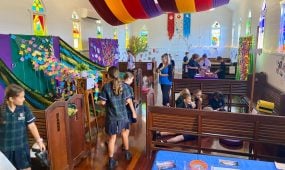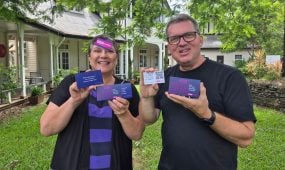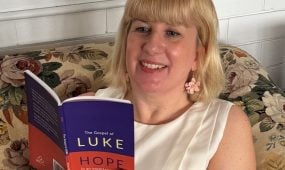Week of Prayer for Reconciliation and National Reconciliation Week
Features
Wakka Wakka man The Rev’d Canon Bruce Boase, Yiman woman Olivene Yasso and Quandamooka and Bundjalung woman Aunty Sandra King OAM share their thoughts on the forthcoming Week of Prayer for Reconciliation and National Reconciliation Week, which are held between 27 May and 3 June annually, marking two significant milestones in the Reconciliation journey
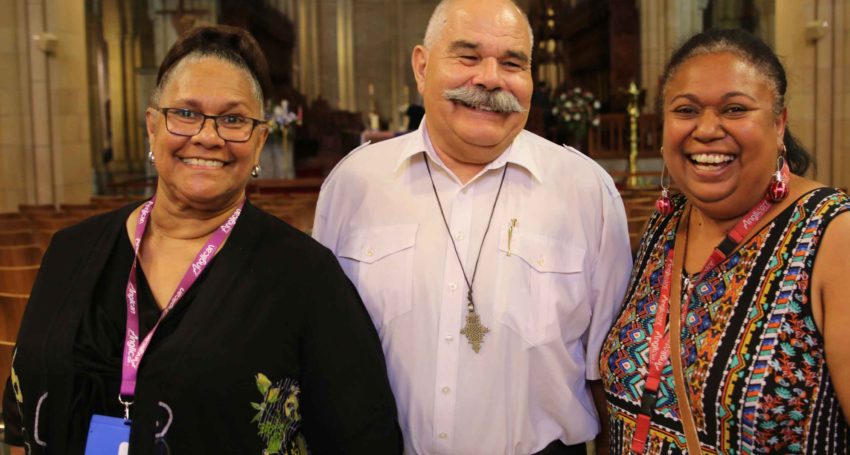
National Reconciliation Week (NRW) and the Week of Prayer for Reconciliation are held between 27 May and 3 June annually. These dates mark two significant milestones in the Reconciliation journey – the successful 1967 referendum and the High Court Mabo decision respectively.
Week of Prayer for Reconciliation – The Rev’d Canon Bruce Boase, Wakka Wakka man and Co-Chair of Reconciliation Action Plan Working Group
For me, to be reconciled means that people have to come together. The coming together involves a sharing of just who we all are. In that recognition we will see that we are all different. We are a diverse community. Reconciliation not only sees that difference but celebrates it and supports each other’s difference. Respect for each other is necessary in this coming together. In the coming together, only then people can find true peace.
Advertisement
We do live in a diverse nation. For tens of thousands of years, people have walked this land speaking different languages, having different stories and knowing their own song-lines. Not so long ago more people started to come and they, too, had different ways. Sadly, in many places, these ways were forced upon those who were already here. Through the recent history of the land other peoples have come bringing their different cultures. This all adds to the mix.
The original forcing of the coloniser’s ways has never really been fully known nor taught when it is. As a nation we have a great opportunity to reconcile ourselves with the past, each other and the land. All of this so that we can continue to grow in harmony, respect, peace and love for one another. If we are to be Australians, we must come together as a people.
Reconciliation is a cornerstone of the Christian faith. We, as Christians first and Anglican Christians next, have a story with and in Jesus Christ. We have to tell that story to remember just who it is we come together in. To be able to tell that story, which is common to all Christians, we have to first come together as a people. That is, we have to be reconciled with each other. Then and only then can we be reconciled in and through Jesus Christ. Anglicans in the past have played a big part in both the sad parts of the story and the joyful encounters with each other. All parts of our story as Anglicans in this land need to be told. We do need to recognise our past, respect those who journey with us in our present and grow into a future as children of God through Jesus Christ.
Advertisement
Reconciliation
By Bishop Arthur Malcolm
Lord God, bring us together as one,
reconciled with you and reconciled with each other.
You made us in your likeness,
you gave us your Son, Jesus Christ.
He has given us forgiveness from sin.
Lord God, bring us together as one,
different in culture, but given new life in Jesus Christ,
together as your body, your Church, your people.
Lord God, bring us together as one,
reconciled, healed, forgiven,
sharing you with others as you have called us to do.
In Jesus Christ, let us be together as one. Amen.
(A Prayer Book for Australia p.203)
The Seasonal Additions for Australia written by the Koori Commission of the Anglican Diocese of Canberra and Goulbourn can be found on p.161 of A Prayer Book for Australia, which includes ‘A Prayer For Australia’, especially written for Eucharist Services with the theme of Reconciliation.
National Reconciliation Week – Olivene Yasso, Yiman woman and Indigenous Cultural Capability Facilitator (Anglicare SQ)
Who would have thought the National Reconciliation Week (NRW) 2020 theme ‘In This Together’ would echo across the world for totally different reasons? Yet the parallels of our community’s collective response to COVID-19 with the Reconciliation movement is intriguing. The NRW theme conveys the message that “Reconciliation is a journey for all Australians – as individuals, families, communities, organisations and importantly as a nation” and “everyone has a role to play when it comes to Reconciliation.”
We can choose to ignore, cover up or dismiss the atrocities of our history that have impacted Aboriginal and Torres Strait Islander peoples, both in the past and the injustices continuing today. Or as a nation, we can stand together united and take the necessary proactive and preventative measures needed to heal. The collective action we have been taking since March to keep our communities safe in the wake of COVID-19 shows what we can achieve when we stand united.
When the World Health Organisation first used the word ‘pandemic’, I was curious about its meaning. It comes from the Greek words pan (all) and demos (people) and the dictionary describes it as something “occurring over a wide geographic area and affecting an exceptionally high proportion of the population.” Our First Nations populations decreased at an estimate of 90% in the first 10 years of colonisation. An epidemic, you might say, but when you count the reduction of populations of First Nations peoples across the world by colonisers, for me it leans more to a pandemic.
The statistics continue to demonstrate the residual impacts today, as Aboriginal and Torres Strait Islander peoples retain higher proportionate death rates to non-Indigenous Australians in areas such as suicide (4 times higher among 15 to 24 year olds), diabetes rates (5.2 times higher) and child mortality rates (2 times higher), however this has now widened. Over 50% of our children continue to be taken into out-of-home care, which is 10 times the rate of non-Indigenous Australia. The list goes on.
So, for me National Reconciliation Week is about acknowledging the history (National Sorry Day), righting the wrongs and recognising the First Peoples’ continued connection to land (Mabo Day).
At its heart, National Reconciliation Week is about establishing respectful relationships that create healing for the nation to move forward in Reconciliation.
This involves all Australians as it impacts all of us, as we are all In This Together.
National Reconciliation Week – Aunty Sandra King OAM, Quandamooka and Bundjalung woman and ACSQ Reconciliation Action Plan Coordinator
The first time I heard the word ‘Reconciliation’, I thought, “How can we reconcile when we are not united as one?” This initially baffled me, but I still loved what it stood for as it resonated with who I am, my beliefs and my ‘business’. I see Reconciliation as two identities connecting from a complicated and troubled past.
This makes this year’s theme for National Reconciliation Week #InThisTogether2020 quite appropriate. We are all in this together – to help build a country of mutual tolerance, respect, acknowledgement and understanding, which are all qualities underpinning our Christian faith.
National Reconciliation Week (NRW) is held between 27 May and 3 June annually. These dates mark two significant milestones in the Reconciliation journey – the successful 1967 referendum and the High Court Mabo decision respectively.
This year Reconciliation Australia commemorates 20 years of shaping our country’s journey towards a more just, equitable and reconciled Australia. This year, we also mark the 20th anniversary of the Reconciliation walks of 2000, when people came together to walk on bridges and roads across Australia to demonstrate their support for a more reconciled nation.
I hope you join in the many online events and activities that are happening during this special week. Given the limitations of the COVID-19 environment, Reconciliation Australia is encouraging Australians to think differently and creatively about our plans, as we take our events online, and join in social and digital media conversations.
National Reconciliation Week (NRW) is a time for all Australians to learn about our shared histories, cultures, and achievements, and to explore how each of us can contribute to achieving Reconciliation in Australia. Reconciliation ties in with the Fourth Mark of Mission of the Anglican Communion, as explained in our Reconciliation Action Plan (RAP), which states that:
“Reconciliation is specifically identified as a key imperative within the Fourth Mark of Mission of the Anglican Communion, as part of God’s Transformation of our lives and all of Creation. Indeed, within Australian contexts, it is hard to see how justice can be done to any of the five international Marks of Mission without adequate attention and will being brought to Indigenous reconciliation issues (p. 3).”
Our Diocese’s commitment to Reconciliation makes me feel honoured to be the Reconciliation Action Plan Coordinator for the Anglican Church Southern Queensland.
My experience as a Quandamooka (Stradbroke Island) and Bundjalung (Tweed Heads) woman has shown me firsthand why Reconciliation is so critical for all Australians. While I have been identified as ‘Aboriginal’ since I was born, I have not always been identified as a human being. In the past, I have been classed as ‘Aboriginal’ in an often derogatory manner, and even told what I can and cannot do due to being Aboriginal, including in previous workplaces. I have also been watched suspiciously when walking into shops just for being Aboriginal. And, I have also had to endure innuendo and racist remarks.
This prejudice has been compounded by not knowing until relatively recently about my family’s connection to the Stolen Generations because of the fear and shame my grandmother and father subsequently experienced.
Being Aboriginal is who God wants me to be and despite all the trials and tribulations, I thank Him because I am so privileged and proud to be Aboriginal – to be part of the world’s oldest continuously living culture.
With the strength and support of our cross-Commission Reconciliation Action Plan Working Group, we will continue to help break down the barriers and change people’s perceptions, including through our National Reconciliation Week initiatives.
We are all #InThisTogether2020 to make this country great by living an active faith.
This is how I see Reconciliation and what actions can help in healing and uniting us under God’s grace and guidance:
Respect our Truth, our Being, our Worth and each other
Engage with each other in your workplaces, parishes, schools and ministries
Christian faith and beliefs help heal us and move us forward together in harmony as one
Open-mindedness…Be open-minded when learning or listening about First Nations peoples
Network with community, businesses, organisations and corporations
Consider each other’s history, upbringing and feelings and learn and grow from this
Inform family, friends and colleagues of Australia’s spiritual ancient history, culture and peoples
Look, Listen and Learn from each other
Involve yourself in activities, programs and events during National Reconciliation Week
Acknowledge and action the Anglican Communion’s Marks of Mission
Tolerance…We all need to be tolerant of each other’s views, religions and practices
Imagine what the world will look like if it didn’t include ignorance, racism, intolerance and prejudice
Organise an online event or activity to celebrate National Reconciliation Week
Never too late to change perceptions for a united future as we are all #InThisTogether2020
Reconciliation starts with me…I hope there are many non-Indigenous people who feel confident and strong enough to say that, too.
On Sunday 31 May, after the Cathedral Evensong service, I will be reflecting on my own life experience in the context of National Reconciliation Week, including discussing what a culturally safe work environment looks like. I will also discuss my shock of learning that my father and several other family members were forcibly removed from their families and homelands as children. I hope that sharing my story will help people across our Diocesan community understand why Reconciliation is so important.
Related Story
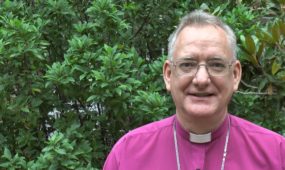 Video
Video
Message for National Sorry Day 2020
The Sunday 31 May Evensong service can be watched online via the Cathedral YouTube’s channel from 6 pm. From 7 pm, I will be speaking and answering questions via a Q&A on Zoom. For more information on the Q&A, please visit the St John’s Cathedral Facebook event page.
For a full program of ACSQ events and a list of resources, visit the Reconciliation Action Plan page on the ACSQ website.
There are also a number of National Reconciliation Week and Reconciliation-themed resources available online, including the following:
National Reconciliation Week
Reconciliation Australia
A Voice in the Wilderness: Listening to the Statement from the Heart
National Museum of Australia
Australian Human Rights Commission: Bringing them home



